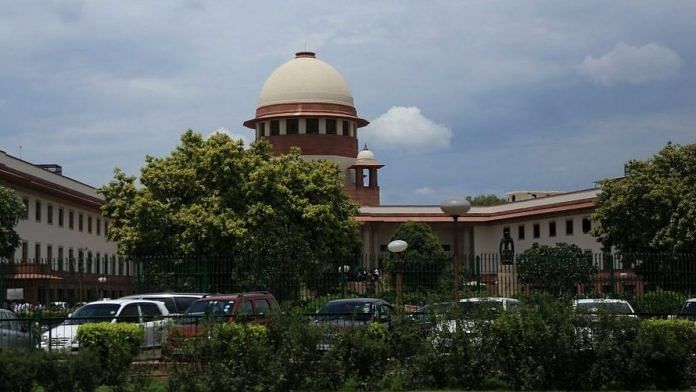New Delhi: The Supreme Court Wednesday said the office of the Chief Justice of India is public office under the Right to Information Act.
The unanimous verdict was pronounced by a five-judge bench led by CJI Ranjan Gogoi.
Justice N.V. Ramana, Justice D.Y. Chandrachud, Justice Deepak Gupta and Justice Sanjiv Khanna were the other members on the five-judge Constitution bench.
Reading out the judgment, Justice Sanjiv Khanna said judicial independence and accountability go hand in hand.
The top court had reserved its verdict in the case in April after it heard a plea filed by the Supreme Court secretary general challenging a landmark 2010 Delhi High Court order bringing the CJI’s office within the ambit of the Right to Information Act, 2005.
The HC order had come on a plea filed by RTI activist Subhash Chandra Aggarwal who had sought details on judges’ assets.
Also read: Losing govt’s grip to winning people’s trust – a lot is riding on CJI Gogoi’s last 4 cases
Subject to Right to Privacy
One aspect of the verdict remains that the disclosure under the RTI Act would be subject to certain conditions. One such condition is that information sought must not violate the Right to privacy of the CJI.
“The Right to Information and Right to Privacy are two sides of the same coin. None can take precedence over the other,” the court said.
Taking a call on whether or not to give out information from the office of the Chief Justice, the Right to Privacy is an important aspect and has to be balanced with transparency, the judges said.
Justice Chandrachud, who authored a separate verdict, said the judiciary could not function in isolation and that it must “discharge public duty”.
On SC collegium
On the question of whether the deliberations of the Supreme Court collegium comprising five senior most judges in the appointment of judges or lawyers be made public, the SC said such requests should be decided on a case-to-case basis keeping in mind the larger public interest.
The bench said only the names of judges recommended by the collegium for appointment can be disclosed, not the reasons.
How the case started
In November 2007, Subhash Chandra Aggarwal filed an RTI in the Supreme Court seeking information on judges’ assets.
When the information was denied, Aggarwal approached the Central Information Commission (CIC), which asked the apex court to disclose information on the ground that the CJI’s office comes within the ambit of the RTI Act.
In January 2009, the top court moved the Delhi High Court against the CIC order as the cause of action of the dispute was in Delhi.
It contended that declaration of assets by its judges to the CJI is “personal information” which cannot be revealed under the RTI Act.
“Too much transparency can affect the independence of the judiciary,” it said.
A single-judge HC bench on 2 September 2009 upheld the CIC order. The case was then referred to the three bench of the Delhi HC, which upheld the 2009 order. Thereafter, the case reached SC on appeal.
Also read: No NJAC but Modi govt still manages to have a say on judges’ appointments, transfers
‘Process shrouded in mystery’
During the Supreme Court hearings earlier, advocate Prashant Bhushan appeared for RTI activist Subhash Chandra Aggarwal, who had sought details on judges’ assets, Aggarwal and argued that while the court favoured transparency through its various judgments, it “has not been very forthcoming” in cases relating to transparency within the court.
Through his plea, Aggarwal stressed that there was a need for transparency in the appointments and transfer of judges.
“Disclosure of information is the best safeguard to ensure the right people get appointed and disclosure must be in public and has to be for the public,” said Bhushan.
“The process of appointment and transfers is shrouded in mystery. It remains a sacred ritual and its mystery confined to a handful of people,” Bhushan said.
He added that the possibility cannot be ruled out that the process may on occasions result in “wrong appointment or transfer and may lead to nepotism”.
Every step towards transparency only engenders “greater public confidence in the institution”, be it the publication of the Supreme Court collegium resolutions, or the roster, or even the list of candidates for senior advocate’s designation, said Bhushan.
However, during this April hearing, CJI Gogoi remarked how too much disclosure of information was affecting appointments to the higher judiciary.
“Of late, we are experiencing good people, who have opted to become judges, withdrawing their consent. On interaction, the reason appears to be the possibility of the negative observations, whether rightly or wrongly, being brought into the public domain. In such a case, not only does he not become a judge, but his reputation, his professional life, his family life are all adversely affected,” the CJI observed.
Justice Gogoi said that nobody is for a system of opaqueness.
“Nobody wants to remain in a state of darkness or keep anybody in the state of darkness. The question is of drawing a line. In the name of transparency, you can’t destroy the institution…” he added.
Also read: Collegium deliberations on judges should stay confidential, says CJI-designate Bobde




RTI is now sufficiently sanitised to everyone’s liking, it seems.
Praiseworthy. The deliberations of the Collegium too should be more transparent, once the decision is taken.